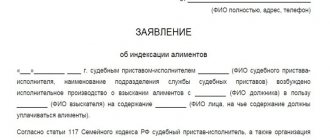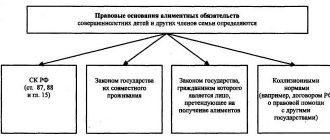A review of judicial practice on the collection of alimony in Russia allows us to summarize and analyze the state of affairs, make, if necessary, amendments to the legislation, and also determine trends in this area of relationships. The latest generalized data of judicial practice regarding the assignment of alimony for children who have not reached the age of majority, as well as disabled children of adult age, was carried out for the period from 2013 to 2014. The results of its implementation in a summarized form were published in May 2015 by decision of the Supreme Court of Russia.
Children's rights to special conditions of care and assistance
The rights of children to help from their parents, as well as care for their normal existence and development, are spelled out in the Declaration of Human Rights. This responsibility is also imposed on parents by the Convention protecting the rights of the child. The child must develop physically, spiritually, morally and socially normally. The main responsibility, in accordance with this document, in ensuring adequate living conditions for children lies with parents in accordance with their abilities and financial capabilities.
Article 38 of the Constitution of the Russian Federation states that family, childhood and motherhood have the protection of the state, and parents must take care of the child and his upbringing.
Regulation of all issues relating to the maintenance of persons under the age of majority, as well as children who are disabled, is carried out in accordance with the RF IC. This is the main document that underlies the protection of the child’s rights to his maintenance until he reaches adulthood.
A review of judicial practice speaks of the current problem of non-payment of alimony to minor children by one of the parents who lives separately from the child. Often, alimony payments are made in amounts that are not sufficient for the normal maintenance of children, or are absent altogether due to the refusal to pay them voluntarily.
The state has developed a National Strategy, which provides for actions aimed at ensuring children's rights and has been implemented since 2012. Its full implementation is planned for 2021. This document provides for the development of measures designed to ensure the regularity of alimony payments, in quantities sufficient for the normal maintenance of each child, which should lead to a reduction in the number of children who do not receive material support in the required amount.
As a result of the analysis of judicial practice, it was established that, in general, the determination of the provisions of the legislation applied during the consideration of court cases on alimony was carried out correctly by the court authorities. At the same time, the clarifications of the Supreme Court of Russia concerning the application of legislative acts relating to adoption, establishment of paternity and collection of alimony were taken into account.
Grounds for exemption from alimony payments
When wondering how to avoid paying alimony debt, you should know that the law provides grounds for exemption from this burden.
In accordance with Article 115 of the RF IC, the payer and recipient of alimony can agree among themselves to reduce the amount of alimony. However, child support for minor children will have to be paid in any case.
The court has the right to release the alimony holder from the alimony burden if there is sufficient evidence of the impossibility of payment (in case of disability, in case of financial difficulties).
Judicial practice also testifies to the possibility of exemption from alimony payments. The Perm Regional Court in its certificate dated March 10, 2008 “On the application of legislation on alimony obligations” indicates that such valid reasons as military service or serving a sentence in prison are grounds for exemption from alimony obligations.
Statistics on alimony cases
A significant place in the collection of alimony is occupied by cases of alimony obligations for children who are not adults. Such cases relate to the work of a court of general jurisdiction, and most of them are considered by magistrate courts with the issuance of court orders in accordance with Chapter 11 of the Code of Civil Procedure of Russia.
A review of judicial practice shows that in recent years the number of cases for the collection of alimony has been continuously growing. There is an increase in cases completed by magistrates' courts for the period from 2012 to 2014 in the amount of 9951 cases.
The issuance of decisions or court orders by court authorities during the same period increased by 9,397 cases. The requirements for the collection of child support for the period 2012-2014 were satisfied. in 99% of cases of the number of cases in which decisions or court orders were made.
Judicial practice statistics show that the vast majority of court cases for the collection of child support in the courts were carried out within the time limits established by law for their consideration. Deadlines were violated in only 1% of the total number of cases considered and completed. Acceptance of applications to solve problems of collecting alimony for disabled and minor children
You may also be interested in:
- How to collect alimony from your spouse?
- Indexation of alimony: grounds, procedure
- How much child support is required for three children? (Examples of calculations)
- Several ways to find out alimony arrears
Watch also the video on how to collect alimony:
Applications for a court order
The bulk of cases for the collection of alimony were submitted to magistrates' courts, and writ proceedings were applied to them. Its regulation is carried out by Chapter 11 of the Code of Civil Procedure. Resolution of issues regarding the acceptance of applications was carried out in accordance with the norms of the current Code of Civil Procedure, clarifications made by the decision of the plenum of the Supreme Court on the application of the RF IC during the consideration of cases by which paternity is established and alimony is collected.
Judges have the right to issue court orders if a request is received that does not require:
- establishing paternity (maternity);
- challenging it;
- involve other interested citizens.
A court order for the collection of alimony cannot be issued in hard monetary terms, since to resolve this issue it is necessary to check the presence or absence of various circumstances provided for by law.
Filing claims for alimony collection
A review of judicial practice also shows that claims for the recovery of alimony funds in favor of children were returned due to the applicant’s failure to comply with the judge’s instructions within the period specified by him.
In addition, the reason for the return was:
- lack of jurisdiction of the case to the court in which the application was received;
- the application was submitted by persons without the necessary authority to sign it and present it to the judicial authorities;
- receipt by the court before the ruling of an application for the return of the claim.
The grounds for refusing to accept a claim for alimony were:
- filing a statement of claim in order to protect the rights and interests of a person to whom this right does not apply;
- if there is a lawful court decision that has entered into force in relation to the dispute between the parties, and concerning the same issues and on the same grounds.
Cases of patrimonial jurisdiction
Judges determined family jurisdiction in alimony cases in accordance with current legislation and decisions of the Supreme Court.
At the same time, cases concerning child support disputes in relation to children who are not adults, disabled children who have become adults, as well as:
- on changing the amount of alimony,
- to collect penalties for overdue alimony payments, incl. in an amount that exceeds 50 thousand rubles,
- have jurisdiction over magistrates' courts.
If at the same time the plaintiff demands:
- deprivation of parental rights,
- establish paternity,
- resolve the controversial issue of determining the child’s place of residence,
- jurisdiction over such cases is given to district courts.
The plaintiff also has the right to combine in one application all of his claims that are related to each other, but with different jurisdiction. Such applications are subject to jurisdiction by district courts.
Jurisdiction of cases on a territorial basis
Claims for child support can be brought geographically to the courts at the place of residence of the plaintiff, and not only at the place of residence of the defendant.
The same principle applies in the case of accepting applications that require:
- compensation for penalties for late payment of alimony;
- increasing the amount of alimony payments.
If a claim is brought by the payer of alimony with a demand to reduce the amount of payments, to exempt them from collection, such applications are accepted at the place of residence of the defendant in accordance with the general rules that regulate the jurisdiction of cases.
This requirement is also contained in the explanations of the decision of the Supreme Court of Russia, issued on October 25, 1996. No. 9.
Reasons for disputing debt
The main two motives are that the alimony payer wants to change the amount that has been decided for payments, or to completely abandon this obligation. Let's consider the factors that influence the court's decision when requesting a waiver of alimony:
- the father is not a biological parent;
- the payer wants to sue the recipient for the right to full upbringing and maintenance of the child;
- criminal actions against the alimony payer on the part of the recipient of payments;
- death of one of the spouses;
- the child reaches adulthood;
- the occurrence of conditions under which payments cease, up to 18 years of age (marriage, entrepreneurial activity, etc.);
- other circumstances provided for in the agreement.
To challenge a court decision, you must use a special procedure - file an appeal or cassation appeal. The first is used in cases where the decision has not yet entered into force, the second - when the deadline for appeal has passed (but within six months from the moment of its application in practice). If time is lost, the payer must file a new claim - it is impossible to appeal an already made decision.
You can also file an objection regarding the amount of funds. In the case of the payer, this often occurs due to a deterioration in the financial situation. The decision to reduce the debt is beneficial for both parties, because the recipient risks completely losing financial support due to the inability of the alimony payer to pay off the debt for objective reasons.
The process of considering cases of collecting alimony for minor children
The amount of child support as a share of the parent’s earnings or other income.
A review of generalized judicial practice published in 2015 indicates the correct determination of alimony amounts as a share of the parent’s earnings or other income.
If the payer of alimony does not have an agreement, its monthly amount, calculated from the parent’s income, will be:
- ¼ to one child;
- 1/3 to two children;
- ½ for three or more.
If there was a demand for alimony for a minor in amounts higher than those established in the Family Code, the courts applied clause 1 of Art. 81 of this code. In accordance with this, the share amount can be increased or decreased, while the court considers compelling evidence of the existing circumstances. If they are absent, the courts decided to collect funds for the maintenance of children in shared terms, calculated from the payer’s earnings.
In accordance with the summarized data of judicial practice for 2012, which contains a review of the Supreme Court, the transfer of funds for the maintenance of a child in the amount of up to 50% to his bank account is possible only in the event of improper performance by the parent receiving alimony of his parental responsibilities.
A court order and resolution of a court decision to collect alimony for two or more children in shares of the payer’s earnings and other income.
Judging by the generalized data of judicial practice from the review of the Supreme Court, the satisfaction of demands for the collection of alimony funds in favor of two or more children in shares of earnings, the courts set out their resolution in the decision in different ways.
Some judicial authorities, both in the resolution of the decision and in the writ of execution, or in the court order, established changes in the amount of alimony and the terms of their collection in new amounts in accordance with how the children reach adulthood. Other courts that have established the amount of alimony to be paid for each child on the day of the court decision establish a general period for collecting money for children in the same amount until they reach adulthood.
In this case, it is necessary to take into account that children become adults at different times and this circumstance requires a review of the amount of payments to the remaining minor children in accordance with Article 81, paragraph 1 of the RF IC with the issuance of an appropriate court order.
It is necessary to pay attention to what is indicated by the courts in the resolution of the decision. It must be stated there that when one child reaches 18 years of age, alimony for other children must be collected in other amounts determined by the court.
Collection of alimony payments in a fixed amount or partially in a fixed amount and in shares
The assignment of alimony in this way was applied correctly by the courts. Courts have the right to determine the amount of payments in fixed monetary terms or in shares simultaneously with a fixed amount, in the case of:
- the payer has variable or irregular income;
- receipt by the payer of earnings in currency, in kind or partially in currency and in kind;
- lack of any income from the payer;
- in other cases, when it is not possible, it is difficult to collect alimony in shares of earnings, or there are significant violations of the rights of any party.
When collecting child support using this method, the courts took into account the requirement to ensure the child’s previous standard of living, the property or social status of the family.
How cases of collecting alimony for adult children with disabilities were considered in the courts
Such cases, as evidenced by a review of judicial practice summarized by the decision of the Supreme Court and published in 2015, were considered in courts quite rarely. In this case, the courts relied on Article 85 of the IC of Russia, the provisions of which oblige parents to support children who have become adults but are unable to work and who need help. If there was no agreement on the payment of alimony, its amount was determined by the courts in fixed monetary terms with monthly payments.
In doing so, the courts took into account the financial and family status of the parties. In these cases, the requirements of paragraph 17 of Resolution No. 9 of the Supreme Court of the Russian Federation dated October 25, 1996 were taken into account: claims can be brought by adults themselves, and in case of their incapacity - by persons appointed as guardians.
Legislation of the Russian Federation on alimony
Issues regarding the collection of alimony are regulated by the Family Code of the Russian Federation. Decree of the Government of the Russian Federation of July 18, 1996 No. 841 “On the list of types of wages and other income from which alimony is withheld for minor children” regulates from which income alimony can be collected.
Since the collection of alimony, as a rule, is carried out through the court, when applying to the courts one should be guided by the norms of the Civil Procedure Code of the Russian Federation, and at the stage of executing court decisions - by the norms of the Federal Law of October 2, 2007 No. 229 “On Enforcement Proceedings”.
In addition, regarding enforcement proceedings for the collection of alimony, one should take into account the letter of the FSSP dated June 19, 2012 No. 01-16 “Methodological recommendations on the procedure for fulfilling the requirements of executive documents for the collection of alimony.”
Alimony from brothers, sisters, and grandparents
Articles 93 and 94 of the Family Code of Russia allow sisters and brothers in need of help, if it is not possible to collect alimony from their parents, to receive it from a brother or sister who has these funds.
Alimony from a grandfather or grandmother for the maintenance of a grandchild is collected in the same way as from a brother or sister for a minor child or an adult disabled person. Based on data from generalized judicial practice, cases of collection of alimony from this category of possible payers are quite rare.
It is considered unacceptable to resolve such cases through writ proceedings, since the plaintiff is obliged to provide evidence of the child’s inability to collect alimony from his parents, his need for alimony, and the availability of relatives with the necessary funds for this. Such alimony can be established in a fixed amount after examining the financial and family status of the parties.
How to file an objection to the court regarding arrears of alimony?
It is worth saying that this case is being considered without a trial, that is, former spouses are not invited to the courtroom to testify. An application is submitted within the framework of writ proceedings. With the help of a court order, it is indicated that alimony from a certain date is collected in a smaller amount and with a simplified payment system. You can appeal such an order within ten days from the date of receipt; in case of absence for a good reason, a petition is filed.
If decisions on the amount of payments were made through a lawsuit, a statement of claim is filed, which indicates:
- Full name and addresses of the plaintiff and defendant;
- Disagreement with the claim;
- The reasons why there is no agreement with the requirement, and evidence that satisfies the objections;
- Documents confirming the reliability of the arguments.
The recipient may file a complaint against the satisfaction of the appeal or cassation objection, indicating his agreement with the decision made initially, evidence of this and requests to cancel the new decision.
Deadlines for collecting alimony
The review of judicial practice traces the courts' compliance with the deadlines for the appointment and payment of alimony. Article 107 of the RF IC in paragraph 2 states that alimony is awarded from the moment the application to the court is received.
The legislation allows the collection of alimony funds for past periods, but no later than a three-year period from this date. But in order to have the right to receive alimony for the past period, it is necessary to prove that before going to court, the claimant took all possible measures to receive alimony. At the same time, the defaulter avoided paying them. In accordance with the generalized data of judicial practice, it is clear that the courts refused to collect alimony for the plaintiffs for the past period if there was no evidence confirming such facts.
Efficiency of alternative collection methods
Since changes were made to the legislation, collection agencies are forced to act within strictly established limits. In most cases, such organizations work with bank debts by purchasing the debt from a credit institution. It is important to understand that the right to collect alimony by law cannot be transferred to third parties, since this is the exclusive right of minor children .
In addition, the powers of collectors are limited to verbal warnings; such organizations are not vested with the right of forced collection, therefore, the effectiveness of their work is minimal.
Note! Only bailiffs have the right to apply measures determined by Federal Law No. 229-FZ to the debtor. Today, the only effective way to collect alimony debt remains forced collection by authorized government officials.
Collection of alimony before a court decision is made
Based on the results of a review of judicial practice, Article 108 of the Family Code was applied, basically, correctly. Courts have the right to make decisions on the collection of alimony until the court decision enters into legal force, taking into account the financial and family status of the parties. The amount of alimony in this case for a minor child should be determined according to Article 81 of the Family Code of the Russian Federation.
This provision is a special guarantee in the matter of providing children who are not adults and disabled adults with the necessary funds while this dispute is being considered.
In judicial practice, summarized by the decision of the Supreme Court, it can be seen that the courts made a positive decision on the issue of collecting alimony in favor of minor children for the period of hearings on the case and before the final decision was made:
- when the proceedings are suspended due to the sending of a court order;
- in connection with the defendant being put on the wanted list;
- due to the failure of the defendant to appear and the lack of information on his proper notification;
- if necessary, obtain additional evidence.
Changing the amount of alimony payments, exemption from payment of alimony When the courts resolved issues of changing the amount of alimony payments and exemption from their payment, the courts applied the requirements of Art. 119. The Russian Investigative Committee is basically correct. The explanations of Resolution No. 9, issued following the results of the plenum of the Supreme Court of the Russian Federation in November 1996, were also taken into account.
In accordance with this document, when determining the amount of alimony, the courts took into account the financial and family status of both parties to the claim, as well as other facts, such as:
- presence of disabled family members;
- disability or illness that prevents you from performing your previous job;
- hiring a child or starting a business.
Demands for increased alimony payments were made mainly by mothers of children. Payers who paid funds for the child according to judicial acts (debtors), most often fathers, demanded that alimony be collected in a reduced amount. The most common reason for requests for a reduction in the amount of alimony was the addition of a child to the payer’s new family.
Reasons for changing the amount of payments
The court will consider the following reasons:
- a sharp and irreparable deterioration in the financial well-being of the payer;
- the appearance of new children in another family;
- the need to support disabled parents or other relatives;
- the child’s entrepreneurial activity, which partially pays for his needs and expenses;
- private property held by a minor that generates income through rental.
In relation to debt, significant circumstances will be:
- failure to fulfill the duties of care and education by a stepfather or stepmother;
- disability of the second spouse caused by alcohol addiction;
- short period of marriage between the parties;
- criminal or improper behavior of the recipient.









